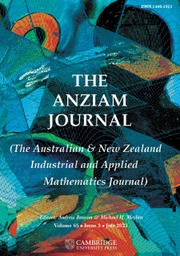Article contents
OPTIMAL QUEUING STRATEGIES FOR AN M/G/1 RETRIAL QUEUE SYSTEM WITH RWV AND ISEV POLICIES
Published online by Cambridge University Press: 19 March 2024
Abstract
Designing a reasonable M/G/1 retrial queue system that enhances service efficiency and reduces energy consumption is a challenging issue in Information and Communication Technology systems. This paper presents an M/G/1 retrial queue system incorporating random working vacation (RWV) and improved service efficiency during vacation (ISEV) policies, and examines its optimal queuing strategies. The RWV policy suggests that the server takes random working vacations during reserved idle periods, effectively reducing energy consumption. In contrast, the ISEV policy strives to augment service efficiency during regular working periods by updating, inspecting or maintaining the server on vacations. The system is transformed into a Cauchy problem to investigate its well-posedness and stability, employing operator semigroup theory. Based on the system’s stability, steady-state performance measures, such as service efficiency, energy consumption and expected costs, are quantified using the steady-state solution. The paper subsequently demonstrates the existence of optimal queuing strategies that achieve maximum efficiency and minimum expected costs. Finally, two numerical experiments are provided to illustrate the effectiveness of the system.
MSC classification
Information
- Type
- Research Article
- Information
- Copyright
- © The Author(s), 2024. Published by Cambridge University Press on behalf of Australian Mathematical Publishing Association Inc.
References
- 2
- Cited by


